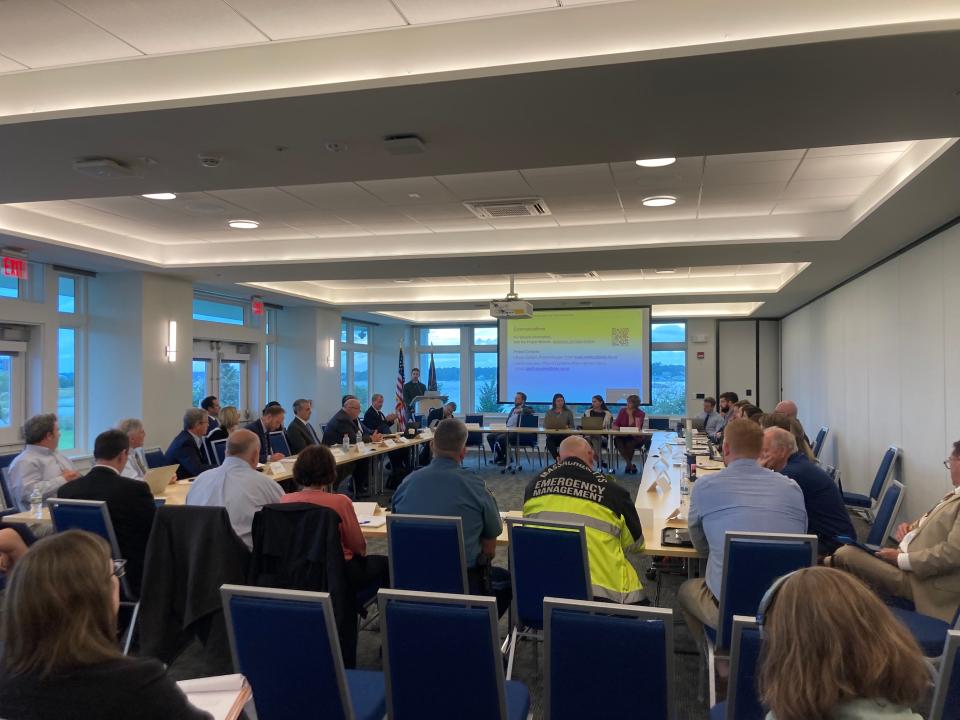Will major maintenance be needed on Bourne Bridge? Inspection in 2024 could affect rebuild
The balance of trying to fund ongoing repairs of the Bourne and Sagamore bridges, yet move toward the $4 billion bridges replacement project was a topic of discussion at a Tuesday meeting in Buzzards Bay, with local, state and federal agencies represented.
“What we're trying to do is just keep things moving along at a sufficient condition by doing smaller maintenance work, like you're seeing here,” Bryan Cordeiro, with the state Department of Transportation, said, referring to the current Bourne Bridge maintenance planned through November. “We want to make sure that we're sort of working between those lines to remain competitive for replacement, because we know that's the right option moving forward.”
There was a concern expressed at the meeting about the potential for a mandatory major rehabilitation for the Bourne Bridge if a bridge inspection by the U.S. Army Corps of Engineers deemed major infrastructure rehabilitation necessary.
Cordeiro, the state project manager for the Cape Cod bridges program, said in the meeting major rehabilitation would interfere with financing the replacement project. The state's Cape Cod bridges program is meant to address "the aging Sagamore and Bourne bridges and the surrounding roadway networks" as one of the most important transportation programs in the region.

U.S. Army Corps of Engineers Project Manager Craig Martin said in the meeting everything is “headed in the right direction” in terms of replacement opposed to major rehabilitation, but a contingency plan is being thought out.
“We're confident we can carry the Bourne Bridge for at least the next five years, potentially longer,” Martin said. “But the plan is to be ready, should we move to that sort of (major rehab) phase.”
The next Army Corps of Engineers inspection for the Bourne Bridge is scheduled for next year, Martin said.
What was the meeting?
Officials from the state Department of Transportation delivered a presentation to an advisory group consisting of over 12 local, state and federal agencies and organizations on Tuesday, hashing out design considerations and updating the group on the Bourne and Sagamore bridges replacement project.
The meeting, which was held at Massachusetts Maritime Academy, included representatives from the town of Bourne, the Cape Cod Commission, U.S. Senator Edward Markey’s office, Massachusetts State Police, the Federal Highway Administration, the U.S. Army Corps of Engineers and the Cape Cod Chamber of Commerce, among others.
On the agenda for discussion were design considerations for the bridges’ frames, multimodal accommodations for pedestrians and bicyclists, vehicle lane size and incline and decline grades. Much of the presentation and discussion centered around considerations for the town of Bourne.
“The bridges are essentially a town of Bourne local road,” said Joe Cahill, design lead from HNTB, the engineering consultancy contracted by the state transportation agency for the project.
Both the Sagamore and Bourne bridges, which cross the Cape Cod Canal, are in Bourne.
Earlier in the year Bourne town officials had expressed concern about what they said was the town's lack of involvement in the process and poor communication between the town and state officials.
Advisory group meeting was open to the public
Although technically open to the public and the media, the meeting was not publicly advertised ahead of time and a link to join over Zoom was not provided to the Times, one official said, because it was intended for official stakeholders such as regional and state officials. In person attendance was permitted for the public and media.
Two members of the public in attendance, Stephan Buckley of Chatham and John York of Bourne, voiced their concerns about the lack of public engagement at the meeting.
York said specifically a lack of disabled representation on the group was concerning. The project plan includes multi-modal accommodations for pedestrian and bicycle use, with a portion of the design plan aimed at accommodations for disabled people — despite a representative disabled presence in the meeting.
“We are open, and we have a process if we wanted to add another member,” said Gareth Saunders, the state transportation agency's legislative affairs highway liaison. He added he had a conversation with a Bourne Select Board member about including a disabled representative to the advisory group. “I think (that) makes a lot of sense.”
Cordeiro said the information discussed at the advisory group meeting would be presented to the public at a yet to be determined date. He said the advisory group is not a decision-making body and is not subject to the state Open Meeting Law.
“We (wanted) to be able to have a more open discussion, a more candid discussion, with people who have key interests in the project, (whose) professional job it is to inform us,” Cordeiro said. “I think everybody needs to have a degree of confidence in the folks in this room to be able to move this project forward on the right path.”
Thanks to our subscribers, who help make this coverage possible. If you are not a subscriber, please consider supporting quality local journalism with a Cape Cod Times subscription.
This article originally appeared on Cape Cod Times: Officials convene for Cape Cod Canal Bridges advisory group meeting

